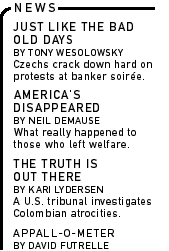
|

|

|

|
| |
|
|
|
Last month a trio of civil liberties groups and eight former inmates filed suit against the state of Florida for a law that strips ex-felons of the right to vote. The suit charges the Florida law has a disproportionate affect on the black electorate, and is thus unconstitutional. The ultimate aim of the action is to challenge all state laws that disenfranchise ex-felons. According to a 1998 report by Human Rights Watch and the Sentencing Project, 2 percent of all Americans, or 3.9 million, have lost the right to vote because of felony convictions. Of that number, 1.4 million (36 percent) are African-American men, which represents 13 percent of all voting-age black men and reflects a rate of disenfranchisement that is seven times the national average. In the states of Florida and Alabama, one in three black men is permanently disenfranchised, and in seven other states that ratio is near 25 percent. If current trends continue, the study notes, 30 percent of the next generation of black men can expect to lose their right to vote at some point in their lifetimes. Laws disenfranchising felons have been around since the early days of the nation, but after the Civil War they took on an added significance and (especially in the southern states) specifically targeted formerly enslaved Africans and their descendants. Currently, 47 states and the District of Columbia have laws that deprive inmates of the right to vote (the three states that permit inmate voting are Maine, Massachusetts and Vermont). Thirty-two states further deny the vote to persons on probation or parole; in 15 states a felon can be barred from voting for life. The skyrocketing growth of the racially disparate inmate population has exacerbated discriminatory effects of these electoral prohibitions. The Florida suit was filed on behalf of the eight former inmates by the Brennan Center for Justice at New York University's School of Law, the Lawyers Committee for Civil Rights Under Law in Washington and James Green, a Florida civil rights attorney. According to Nancy Northup, director of the Brennan Center's Democracy Program, Florida was targeted because it has the largest number of disenfranchised ex-felons in the country, and because the law there was enacted specifically to deny blacks the right to vote in the aftermath of the Civil War. The precedent for this challenge is a 1985 ruling, Hunter v. Underwood, that struck down an Alabama criminal disenfranchisement law under the 14th Amendment's equal protection clause. The court held that any criminal disenfranchisement law that had a racially discriminatory intent and effect would violate that clause. No other democracy bars convicted offenders from voting for life. In fact, many countries—including France, Germany, Sweden, Norway and Poland—permit those in prison to vote. Most democracies have concluded that such laws defeat the purposes of incarceration: rehabilitation and public safety. Since most prisoners will return to the community, society has an interest in cultivating their sense of social obligation and encouraging civic engagement; electoral participation is the bedrock of civic engagement. Disenfranchisement laws are so destructive to democratic values
they can hardly be justified except as part of an exclusivist tradition.
The Florida suit seeks to break that tradition through the courts.
Others are trying in other venues. Rep. John Conyers (D-Michigan)
last year introduced the Civic Participation and Rehabilitation
Act, which would restore the right to vote in federal elections
to individuals who have been released from prison. Conyers' measure
has received little support, but it is a bill whose time has come.
|

